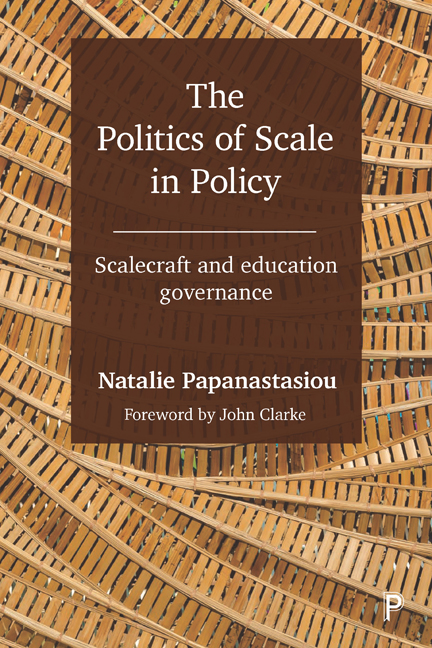Book contents
- Frontmatter
- Contents
- About the author
- Foreword
- Preface and acknowledgements
- 1 Policy, scale and the importance of space
- 2 Problematising scale in the study of policy
- 3 Exposing scale hegemonies
- 4 Knowledge, policy and scale
- 5 Hegemonies of statecraft and scale
- 6 Spatial entrepreneurs and scalecraft
- 7 The practice of scalecraft
- References
- Index
Preface and acknowledgements
Published online by Cambridge University Press: 27 April 2022
- Frontmatter
- Contents
- About the author
- Foreword
- Preface and acknowledgements
- 1 Policy, scale and the importance of space
- 2 Problematising scale in the study of policy
- 3 Exposing scale hegemonies
- 4 Knowledge, policy and scale
- 5 Hegemonies of statecraft and scale
- 6 Spatial entrepreneurs and scalecraft
- 7 The practice of scalecraft
- References
- Index
Summary
We live in political times where practitioners and scholars of policy alike are acutely aware of the deeply interconnected and fluid nature of political space. It is no longer possible to make distinctions or delineate clear boundaries between traditional hierarchies of the local, national and global, and policymakers instead need to make policies which reflect the networked and mobile nature of the political world. Despite this widely-understood political dynamic, scale continues to be the central concept used by policymakers to communicate and make sense of their work. This book explores the political implications of scale holding a privileged position in the toolkits of policymakers and by doing so aims to make a novel contribution to understandings of policymaking practices.
I think it is significant to stress that the ideas developed in this book did not originate from a specific research interest in scale. Rather, they began from a more general inquiry into the practices of policymaking through an engagement with critical policy scholarship. This involved seeking to understand the work of policymaking not as consisting of rational actors, causal mechanisms and clearly defined ‘stages’ or ‘cycles’, but instead adopting a lens which studies policy through problematising webs of language, meanings, knowledge and actions. While considering how to make a contribution to this literature, I was researching England's academy schools policy which was (and continues to be) a policy aiming to reconfigure the relationship between the state, local authorities and schools. An important feature of the agenda of the academies policy was that it advanced a particular idea of who and what were included and excluded from definitions of ‘local’ schools and communities. Engaging with this empirical example made it increasingly clear to me that scale was a major piece of the puzzle in understanding the political implications of policy, and this conviction only intensified during interviews with policy actors whose understandings of scale directly reflected their response to the academies policy.
I considered the critical policy studies literature to be the obvious area to look for clues as to how to begin to understand the significance of scale in advancing readings of policy.
- Type
- Chapter
- Information
- The Politics of Scale in PolicyScalecraft and Education Governance, pp. xiii - xviiiPublisher: Bristol University PressPrint publication year: 2019

